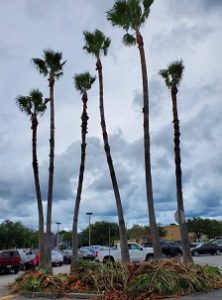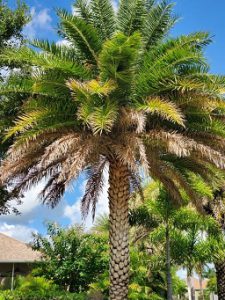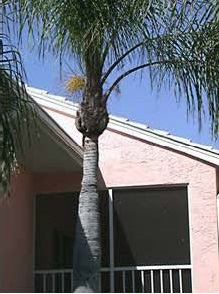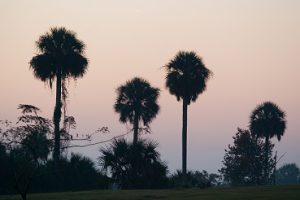Iconic Florida
When folks throughout the world think of Florida, they usually think of alligators, sunshine, palm trees, and hurricanes. Most long-time Florida residents know what to expect concerning each of these things.

The Bad “Haircut”
In recent history, however, there has been a trend by tree-trimming companies to over-prune palm trees. They call it a “Hurricane Cut”. This cut sounds good to newer residents trying to mitigate wind damage. This trend is especially evident when we get into hurricane season. Palm pruning in general can be problematic. But the idea of removing so many green, living fronds for “hurricane safety” is NOT a recommended Florida-Friendly Landscape Management practice. There is NO good reason that palms should be subjected to “The Hurricane Cut”.

Proper Palm Pruning
Ideally, palm pruning removes ONLY fronds that are completely dead and gray-brown. Since palm fruiting branches do not provide health benefits to the palm they may be cut from the tree at any time. If palm fronds are sweeping a structure or are obstructing a high traffic area, such as a sidewalk or driveway, 2 or 3 green fronds may be safely removed from a healthy palm.

Since palm trees are notoriously nutrient deficient in Florida, green fronds should be preserved on the tree. Leaving the green fronds on a palm allows the palm to produce more food for itself. Photosynthesis, how a plant makes it’s food, happens in the leaves of palms. Cutting off green fronds can stress the tree by decreasing its food-making ability. These over-pruned palms will require more applications of expensive chemical fertilizers.
“Busting” Palm Pruning Myths & Mindsets
Contrary to the beliefs of over-eager pruners, the excessive removal of green fronds increases the risk of wind damage to the palm. A palm tree has only one active growth zone located in the palm’s delicate crown center. This area should remain protected by as many fronds as possible. The many fronds shield this growth point from driving storm winds. Though it is normal for a palm tree to lose a few fronds in severe weather, those fronds are unlikely to cause any issues other than adding to debris in the landscape.

Excessive pruning causes “penciling”. Penciling is a palm condition in which the trunk suddenly becomes extremely narrow. This could cause an unnecessary breaking point in severe winds.

Wind & Wild Palms
Florida’s native palms are most definitely wind tolerant. Palm trees in the wild have managed wind and rain events successfully without our ‘assistance’ for centuries and are likely to continue to do so into the future…if we can cease over pruning our palm trees with unnecessary “Hurricane Cuts”.
Pruning Palms – Gardening Solutions – University of Florida, Institute of Food and Agricultural Sciences (ufl.edu) can give you more specific instructions for proper palm pruning.
The University of Florida’s Horticulture site has a superb publication, “Pruning Palms”, with all the instructions you will need to trim your palms correctly and which may be used to educate should you choose to hire a tree trimming company.
Stephen Brown, from Lee County Extension, has an excellent Youtube video in which he shows how to correctly prune a cabbage palm, the Sabal palmetto.
 3
3
